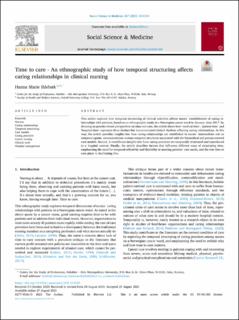Time to care - An ethnographic study of how temporal structuring affects caring relationships in clinical nursing
Peer reviewed, Journal article
Published version
Permanent lenke
https://hdl.handle.net/11250/2984163Utgivelsesdato
2021-09-12Metadata
Vis full innførselSamlinger
- Publikasjoner fra Cristin [3269]
- SPS - Documents [424]
Originalversjon
Social Science and Medicine. 2021, 287 . https://doi.org/10.1016/j.socscimed.2021.114349Sammendrag
This article explores how temporal structuring of clinical activities affects nurses’ establishment of caring relationships with patients, based on an ethnographic study in a Norwegian cancer ward in January–June 2017. By drawing on practice-based perspectives on time and care, the article shows how ‘medical time’, ‘patient time’ and ‘hospital time’ represent three distinct but interconnected clinical rhythms affecting caring relationships. In this way, the article provides insights into how caring relationships are established in nurses’ intermediate role as temporal agents, accommodation various temporal structures associated with the biomedical and person-centred care models. Second, it contributes insights into how caring practices are temporally structured and reproduced in a hospital context. Finally, the article describes factors that influence different ways of structuring time, emphasising the need for temporal reflexivity and flexibility in meeting patients’ care needs, and the role time to care plays in facilitating this.

